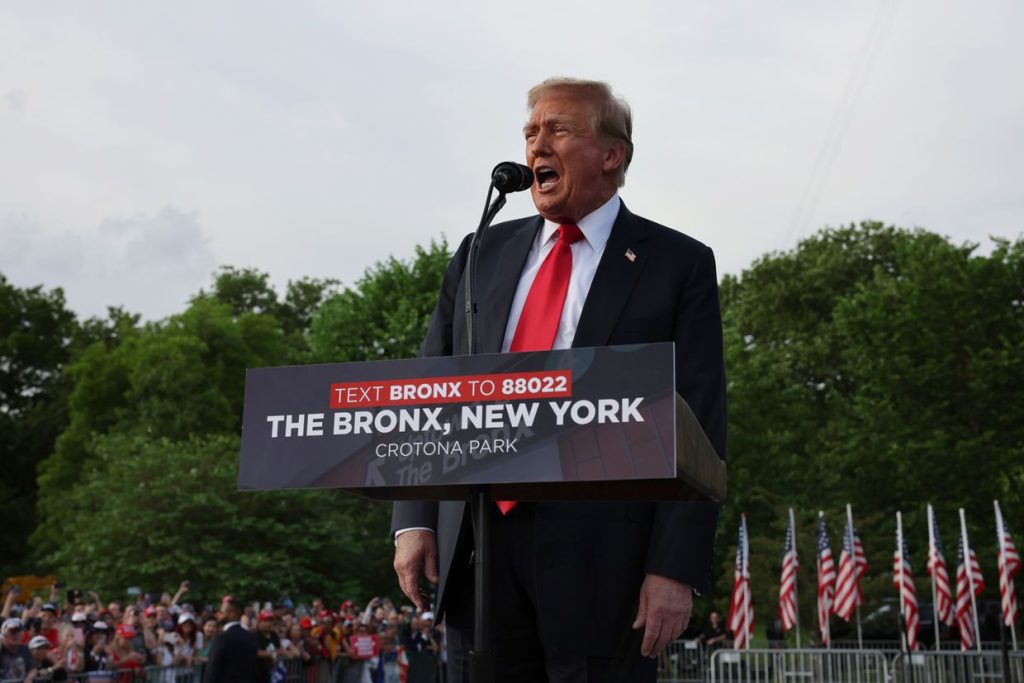Donald Trump claimed at his first rally in New York in eight years that Russia would not have invaded Ukraine and Hamas would not have attacked Israel if he had won a second term. He criticized Biden’s handling of the withdrawal from Afghanistan and suggested that incompetence led to Russia’s invasion of Ukraine. Trump has said he would not commit to providing defense assistance to Ukraine if he won the 2024 election and has praised Putin’s actions as “genius” and “savvy.” Despite claiming he could stop the war in Ukraine in 24 hours, he has not provided details on how he would do so, sparking controversy and skepticism.
The atmosphere at Trump’s rally was likened to a carnival, with a significant presence of pro-Israel supporters. Trump focused heavily on his time as a businessman in New York City and the economy, largely avoiding discussion of foreign policy. The former president’s statements on preventing Russia’s invasion of Ukraine and Hamas’s attack on Israel reflect his ongoing influence on the Republican party and his ambitions for the 2024 presidential election. Trump’s remarks have drawn criticism and raised questions about his approach to international relations and support for Ukraine in the face of Russian aggression.
Russia’s recent offensive into Kharkiv Oblast in Ukraine has put pressure on Ukrainian defenses and highlighted their troop shortage. The two-pronged assault that began on May 10 has forced Ukraine to make difficult decisions about deploying reserves and defending against Russian forces. The ongoing conflict in Ukraine continues to escalate as Russian forces engage in street fighting in towns like Vovchansk. The situation remains tense and uncertain, with Ukraine facing challenges in repelling Russian attacks and protecting its territory.
Trump’s comments on his potential actions in Ukraine, along with his assessment of the situation and his criticisms of the Biden administration, have sparked debate and raised concerns about the future of U.S. foreign policy. As the 2024 presidential election approaches, the juxtaposition of Trump’s rhetoric with the realities of the conflict in Ukraine and other international challenges underscores the importance of leadership and strategic decision-making in addressing global crises. The role of the U.S. in supporting Ukraine and countering Russian aggression remains a key issue in shaping the country’s foreign policy priorities and commitments.
The Washington Post report on Trump’s private statements regarding the situation in Ukraine and his proposed approach to resolving the conflict has added another layer of complexity to the discussion. Trump’s alleged suggestion of pressuring Ukraine to cede Crimea and Donbas to Moscow has raised ethical and diplomatic concerns, casting doubts on his understanding of the complexities of the situation and the interests of the parties involved. President Zelensky’s response underscores the need for a nuanced and comprehensive approach to resolving the conflict that takes into account the interests and aspirations of the Ukrainian people.
Overall, Trump’s rally in New York and his comments on Ukraine and international affairs have sparked debate and scrutiny, highlighting the ongoing challenges facing the U.S. in navigating complex geopolitical issues. The juxtaposition of Trump’s rhetoric with the realities of the conflict in Ukraine and the broader context of global instability raises important questions about leadership, diplomacy, and the role of the U.S. in shaping international relations. As the 2024 presidential election approaches, the stakes are high for determining the direction of U.S. foreign policy and its engagement with critical issues like the conflict in Ukraine.


